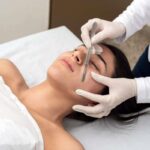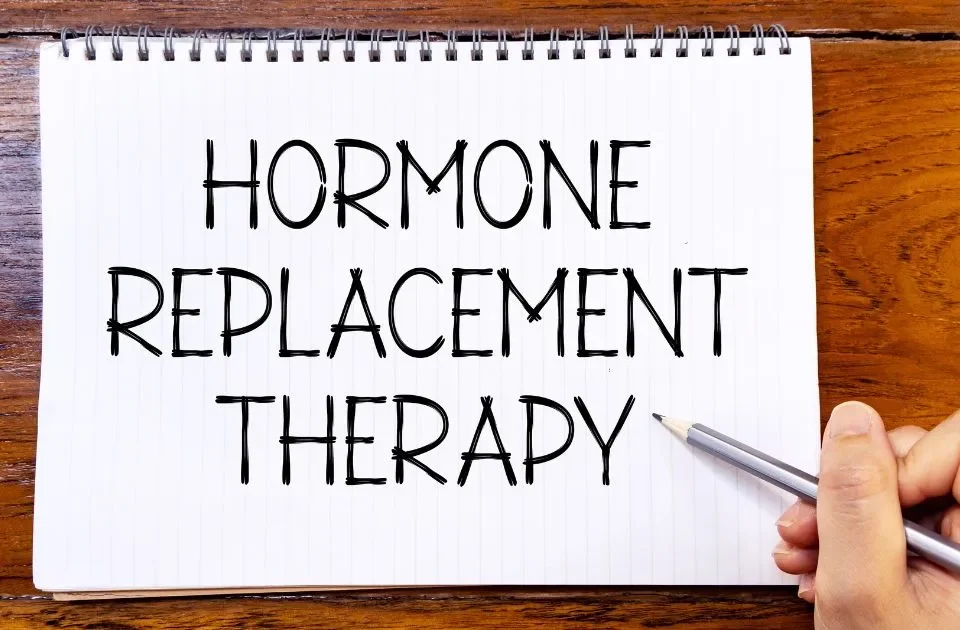
The Benefits of Dermaplaning for Smooth & Radiant Skin
December 13, 2023
Are There Different Types Of PDO Threads For Specific Concerns?
February 7, 2024Hormones, the body’s chemical messengers, wield tremendous influence over our well-being, regulating countless bodily functions. When these vital messengers fall out of balance, their impact can be profound, affecting everything from energy levels and mood to metabolism and sexual health.
Now, imagine a therapy that seeks to restore this delicate equilibrium – Hormone Replacement Therapy (HRT). From Bioidentical Hormone Replacement Therapy (BHRT) to conventional methods, these treatments aim to address hormonal imbalances that often manifest through a myriad of symptoms. But how do you discern whether these therapies are your body’s needs?
What is Hormone Therapy?
Hormone therapy encompasses a range of treatments designed to rectify hormonal imbalances within the body. These imbalances occur when the body produces too much or too little specific hormones crucial for various bodily functions. Hormone therapy intervenes by supplementing or replacing these hormones, aiming to restore equilibrium and alleviate associated symptoms.
Bioidentical Hormone Replacement Therapy (BHRT) stands apart within the realm of hormone therapy. It uses hormones derived from natural sources, such as plants, and structurally replicates hormones naturally produced in the human body. The molecular structure of these hormones mirrors those the body creates, making them biologically identical. BHRT is personalized, crafted to address individual hormonal needs, and is often favored for its perceived natural approach.
How do you know if you have an imbalanced hormone?
Hormone Imbalance Symptoms in Men
Hormonal imbalances in men can manifest through various symptoms, indicating disruptions in testosterone, cortisol, or other hormone levels. Some common symptoms include:
- Muscle Wasting: Reduction in muscle mass and strength.
- Increased Abdominal Fat: Accumulation of fat around the abdomen.
- Low to No Energy: Persistent fatigue or lack of vitality.
- Trouble Sleeping: Insomnia, difficulty falling or staying asleep.
- Man Boobs: Enlargement of breast tissue in men (gynecomastia).
- Hot Flashes in Men: Sudden waves of heat and sweating.
- Night Sweats in Men: Excessive sweating during sleep.
- Low Libido: Decreased sexual desire or performance issues.
- Irritability: Unexplained mood swings or irritability.
- Anxiety and Depression: Emotional fluctuations affecting mental health.
- Hair Loss: Thinning hair or rapid hair shedding.
- Erectile Dysfunction: Difficulty achieving or maintaining an erection.
- Difficulty Urinating: Problems with urination patterns or discomfort.
- Urinating Frequently: Increased frequency of urination.
- Memory Loss: Issues with memory recall or cognitive function.
Hormone Imbalance Symptoms in Women
In women, hormonal imbalances, especially involving estrogen, progesterone, or thyroid hormones, can result in various symptoms, including:
- Unexplained Weight Gain: Increase in body weight without apparent cause.
- Excess Belly Fat: Accumulation of fat around the abdominal area.
- Night Sweats: Episodes of intense sweating during sleep.
- Hot Flashes: Sudden and intense heat waves, often associated with sweating.
- Anxiety and Depression: Fluctuations in mood affecting mental well-being.
- Mood Swings: Abrupt changes in emotions or temperament.
- Low Sexual Desire: Decreased interest or discomfort during intercourse.
- Insomnia: Difficulty falling asleep or staying asleep.
- Low Energy and Fatigue: Persistent tiredness or lack of energy.
- Memory Problems: Difficulty concentrating or memory lapses.
- Lack of Focus: Trouble concentrating or staying focused on tasks.
- Fibroids: Growth of noncancerous tumors in the uterus.
- Endometriosis: Condition where tissue similar to the lining of the uterus grows outside the uterus.
- Premenstrual Symptoms: Intense or disruptive symptoms before menstruation.
- Vaginal Dryness: Lack of natural lubrication causing discomfort.
Understanding and recognizing these symptoms can aid individuals in identifying potential hormonal imbalances and seeking appropriate guidance and treatment.
When do you need Hormone Replacement Therapy?
Hormonal imbalances can significantly disrupt daily life, affecting various aspects of well-being. These imbalances influence physical health, emotional stability, cognitive functions, and overall vitality. Understanding their impact is crucial, as imbalances can lead to chronic fatigue, mood swings, weight fluctuations, disrupted sleep patterns, diminished libido, and cognitive fog. Such disruptions often hinder productivity, strain relationships, and impede one’s ability to lead fulfilling lives.
Assessing the persistence and severity of symptoms associated with hormonal imbalances is critical to recognizing the need for intervention. Symptoms that persist over extended periods or significantly impair daily activities warrant attention. Severity also plays a crucial role; intense or debilitating symptoms can disrupt normal functioning and necessitate professional evaluation. Individuals experiencing consistent, distressing symptoms should consider seeking medical advice to assess if hormone replacement therapy could alleviate their condition.
Seeking Professional Guidance
Seeking professional guidance at JSJ Aesthetics for hormone replacement therapy begins with a comprehensive medical assessment and specialized lab tests. These assessments evaluate hormone levels, uncovering any imbalances or deficiencies.
Accurate diagnosis through lab tests, including blood or saliva analysis, allows healthcare professionals to identify hormonal irregularities precisely. These results are the cornerstone for developing personalized treatment strategies tailored to each individual’s unique hormonal profile.
Consulting experienced healthcare professionals specializing in hormone health is paramount for a thorough evaluation. Their expertise enables a comprehensive assessment of symptoms, medical history, and lab findings. Through this evaluation, professionals can identify underlying causes, recommend appropriate treatments, and guide patients through informed decisions regarding hormone replacement therapy.
Lifestyle Factors and Hormonal Health
Embracing a healthy lifestyle is pivotal in promoting hormonal balance. Lifestyle modifications play a significant role in supporting hormone health and overall well-being. Implementing positive changes includes:
- Balanced Nutrition: Opting for a diet rich in whole foods, essential nutrients, and adequate hydration positively impacts hormonal balance.
- Regular Exercise: Physical activity promotes hormone regulation and overall health, reducing stress and aiding weight management.
- Quality Sleep: Prioritizing adequate sleep fosters hormone production and supports overall well-being.
- Stress Reduction Techniques: Stress management techniques such as meditation, yoga, or deep breathing help mitigate hormonal fluctuations.
- Diet: Nutrient-dense foods, including fruits, vegetables, lean proteins, and healthy fats, provide essential nutrients for hormonal balance. Consuming a balanced diet stabilizes blood sugar levels and aids hormone regulation.
- Exercise: Regular physical activity, including aerobic workouts, strength training, or yoga, positively impacts hormonal health by reducing stress hormones, enhancing mood, and promoting better sleep.
- Stress Management: Chronic stress can disrupt hormone levels. Practicing stress-relieving activities helps regulate stress hormones, supporting hormonal equilibrium.
Conclusion
Whether subtle or pronounced, symptoms affect various aspects of daily life, encompassing physical health, emotional well-being, and overall vitality. Acknowledging these symptoms and their implications is crucial in recognizing the potential presence of hormonal imbalances.
Encouraging individuals experiencing persistent or disruptive symptoms to seek professional evaluation is pivotal. Consulting healthcare professionals at JSJ Aesthetics specializing in hormone health enables thorough assessments, including specialized lab tests, to accurately diagnose hormonal imbalances.
Take the first step towards balanced hormonal health today. Schedule a consultation with us and embark on a path that aligns with your unique needs and restores balance to your hormonal health!


